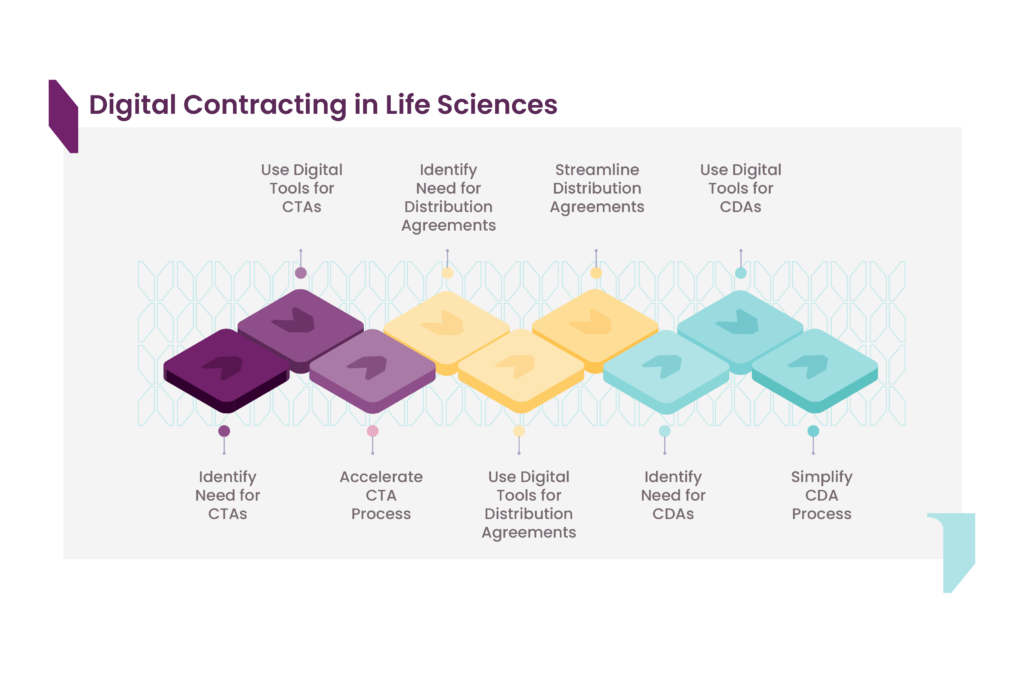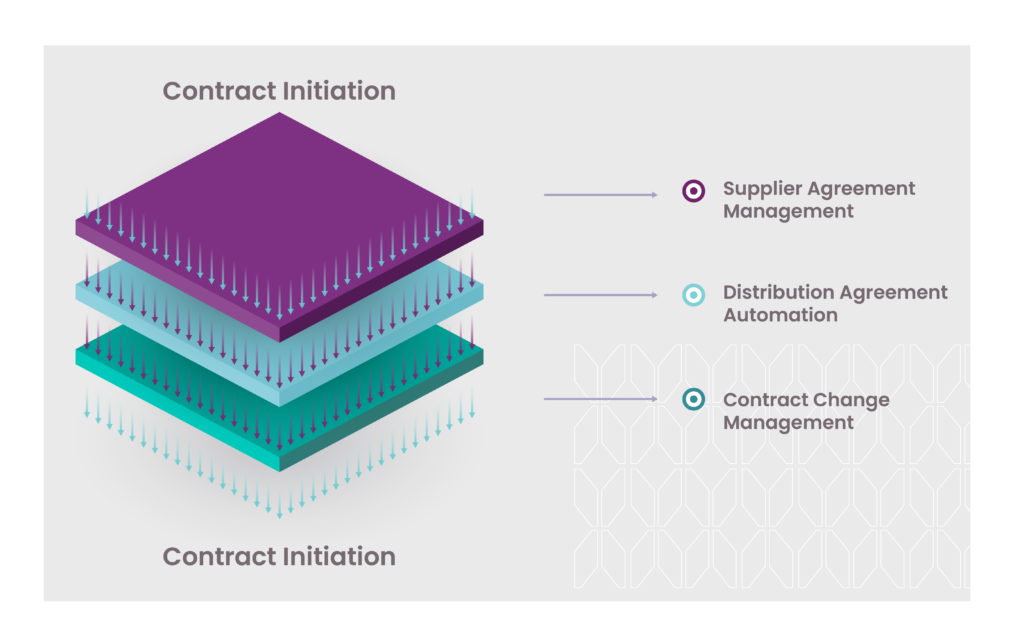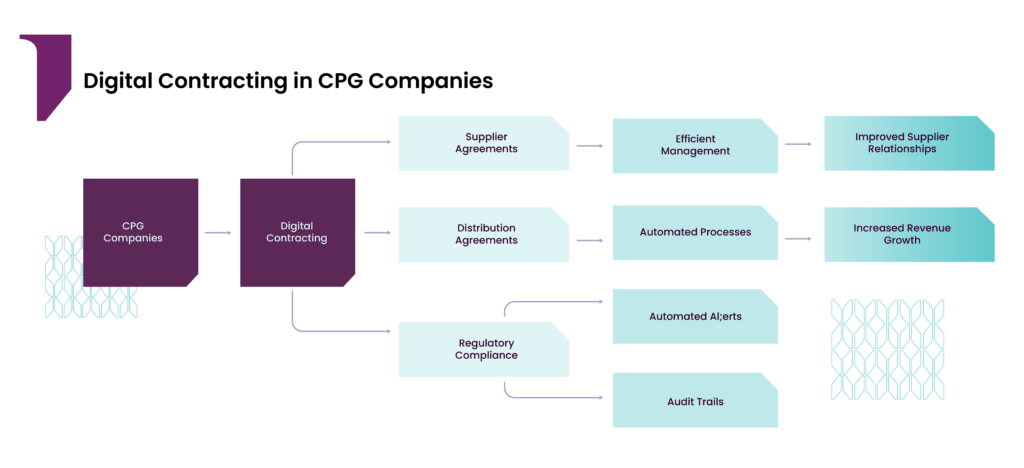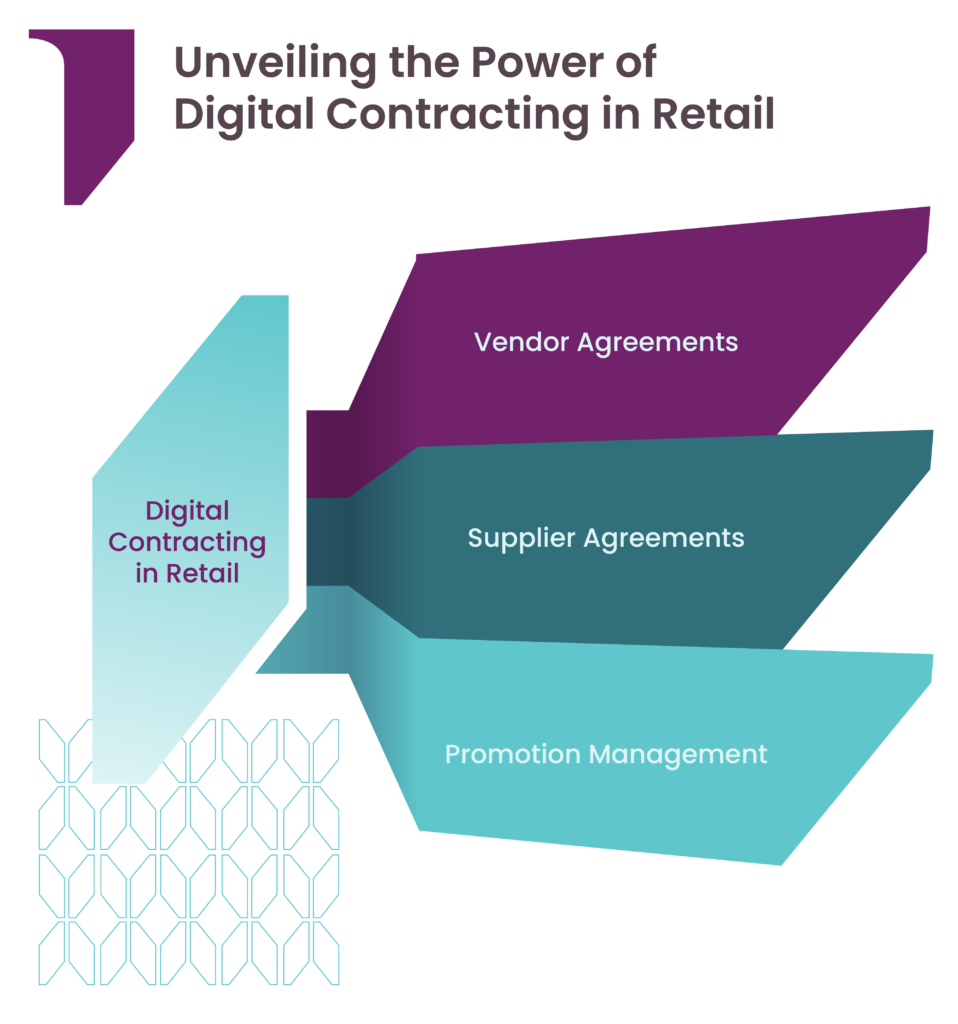Electronic Contract – When to Use CLM for Digital Contracting?
“Switching from manually written, Word-based legal documentation to digital e-contracts feels like putting down the ink pen and using a typewriter instead.” – Everybody who ever tried Digital Contracting.
Traditional paper-based contracts are being replaced by electronic contracts, also known as e-contracts or digital agreements. Electronic contracts are legally binding agreements that are created, executed, and stored electronically, without the need for physical paperwork. This shift towards digital contracting has given rise to the concept of digital contract management.
Digital contract management involves using specialized software and tools to manage the entire contract lifecycle electronically. From contract creation and negotiation to execution, storage, and renewal, digital contract management makes the contracting process more efficient, secure, and collaborative. Electronic contracts, when combined with a robust digital contract management system, offer numerous benefits to organizations across various industries.
In this comprehensive guide, we’ll dive into the world of e-contracts, exploring their key aspects, and advantages, and how a well-implemented digital contract management system can revolutionize the way organizations handle their contracts.
Benefits of Digital Contracting and Electronic Contract Management
The adoption of electronic contracts and digital contract management systems offers a wide range of benefits for organizations. From increased efficiency to enhanced security and improved collaboration, e-contracting has the potential to transform the way businesses handle their agreements. Let’s explore some of the key advantages of digital contracting and electronic contract management.
Increased Efficiency and Productivity
One of the most significant benefits of digital contracts is the ability to streamline processes and save time compared to manual contract management. With electronic contract management, organizations can automate many of the tedious and time-consuming tasks associated with traditional contracting. This includes creating and distributing contracts, obtaining signatures, and storing and retrieving documents.
Digital contract management platforms often provide pre-approved templates and clause libraries, allowing users to quickly generate contracts without starting from scratch. Automated workflows route contracts to the appropriate parties for review and approval, eliminating the need for manual follow-ups and reducing the risk of delays. E-signature capabilities enable fast and secure contract execution, eliminating the need for printing, scanning, and mailing documents. These efficiency gains can lead to shorter contract cycles, faster time-to-revenue, and increased productivity across the organization.
Enhanced Security and Compliance
When it comes to contract management, security, and compliance are top priorities. Electronic contract management platforms offer robust security features to protect sensitive information and ensure compliance with legal requirements. These platforms typically provide secure cloud-based storage, encrypting contracts and restricting access based on user roles and permissions. This centralized repository eliminates the risk of lost or misplaced documents and enables easy backup and recovery.
Electronic contract management systems help organizations maintain compliance with industry regulations and standards:
- GDPR
- HIPAA
- SOC 2
Automated alerts and reminders ensure that contracts are reviewed and renewed on time, minimizing the risk of non-compliance.
Detailed audit trails track every action taken on a contract, providing a complete history of changes and approvals for legal and regulatory purposes.
Improved Collaboration and Communication
Digital contract management platforms enable seamless collaboration among teams and stakeholders, regardless of their location. Multiple parties can access, review, and edit contracts simultaneously, without the need for version control or manual updates. Real-time commenting and redlining features facilitate efficient negotiation and resolution of issues, reducing the time spent on back-and-forth communication.
Integrated communication tools, such as chat and email notifications, keep all stakeholders informed of contract progress and upcoming deadlines. This improved collaboration and communication leads to better alignment among teams, faster decision-making, and ultimately, stronger business relationships.
Better Visibility and Tracking
Another key benefit of digital contracting is the ability to gain real-time visibility into the contract lifecycle. Electronic contract management platforms provide centralized dashboards that display the status of all contracts, upcoming deadlines, and key performance metrics. This enhanced visibility enables organizations to proactively manage their contracts and make data-driven decisions.
With digital contract management, businesses can easily track contract expiration dates, renewal options, and milestones. Automated alerts and notifications ensure that no critical dates are missed, reducing the risk of unintended renewals or lapses in service. Advanced reporting and analytics capabilities provide insights into contract performance, helping organizations identify opportunities for improvement and optimize their contracting processes.
Key Features of Electronic Contract Management Software
The right digital contract management solution should offer a range of capabilities designed to simplify, automate, and optimize the entire contract lifecycle. Let’s take a closer look at some of the most important features to consider.
Centralized Repository and Search Functionality
One of the primary benefits of digital contracting is the ability to store all contracts in a single, secure location. A centralized repository acts as a single source of truth for your organization’s contracts, eliminating the need to search through multiple systems or physical filing cabinets. When evaluating electronic contract management software, ensure that it offers a robust and secure repository with advanced search functionality.
Look for features like full-text search, which allows you to quickly find contracts based on keywords, phrases, or specific clauses. Some solutions also offer optical character recognition (OCR) technology, enabling contract digitization and searching within scanned documents or images. Having a centralized repository with powerful search capabilities saves time, reduces the risk of lost contracts, and ensures that the right information is always at your fingertips.
Automated Workflows and Approval Processes
Manual contract creation, review, and approval processes can be time-consuming and prone to errors. Electronic contract management software with automated workflows and approval processes can help streamline these tasks, reducing the time and effort required to get contracts across the finish line. When evaluating software options, look for features that allow you to create custom workflows based on your organization’s specific requirements.
Automated workflows route contracts to the appropriate parties for review and approval based on predefined rules and criteria. This ensures that contracts move through the approval process efficiently and that all necessary stakeholders have the opportunity to provide input. Some solutions also offer parallel approval processes, allowing multiple parties to review and approve contracts simultaneously, further reducing cycle times.
Electronic Signature Integration
Electronic signatures, or e-signatures, are a critical component of digital contracting. By integrating e-signature capabilities into your electronic contract management software, you can streamline the contract execution process and reduce the time and costs associated with traditional wet signatures. When evaluating software options, look for solutions that offer secure, legally binding e-signature functionality.
E-signature integration allows parties to sign contracts electronically from anywhere, at any time, using a variety of devices. This eliminates the need for printing, scanning, and mailing documents, reducing the risk of delays and errors.
E-signatures also provide a higher level of security and auditability compared to traditional signatures, with detailed logs and timestamps that record every action taken during the signing process.
Reporting and Analytics Tools
To make data-driven decisions and continuously improve your contract management processes, it’s essential to have access to comprehensive reporting and analytics tools. When evaluating electronic contract management software, look for solutions that offer advanced reporting and analytics capabilities that can provide valuable insights into your contract portfolio and performance.
Reporting and analytics tools should allow you to track key metrics, such as contract cycle times, renewal rates, and compliance risks. Look for solutions that offer customizable dashboards and reports, enabling you to view data in a way that makes sense for your organization. Some solutions also offer AI-powered analytics that can identify trends, anomalies, and opportunities for improvement based on your contract data.
By leveraging reporting and analytics tools, you can gain a deeper understanding of your contract portfolio, identify areas for optimization, and make informed decisions that drive business value. This data-driven approach to contract management can help you reduce costs, mitigate risks, and improve overall organizational performance.
Use Cases – Life Sciences Industry

The life sciences industry is known for its complex and highly regulated environment, where contracts play a critical role in ensuring compliance, mitigating risk, and driving innovation. Digital contracting can help life sciences organizations manage a wide range of agreements, including Clinical Trial Agreements (CTAs), Distribution & Supplier Agreements, and Confidential Disclosure Agreements (CDAs).
Clinical Trial Agreement (CTA)
CTAs are essential for conducting clinical trials, but they can be time-consuming and challenging to negotiate. With digital contracting, life sciences organizations can accelerate the CTA process by using pre-approved templates, automated workflows, and e-signature capabilities. This enables faster study start-up times, improved collaboration with research partners, and reduced administrative burden.
Distribution and Supplier Agreement
Distribution & Supplier Agreements are also critical for life sciences organizations, ensuring the timely and compliant delivery of products and services. Electronic contract management platforms can help streamline the creation, negotiation, and execution of these agreements, with features like clause libraries, version control, and real-time collaboration.
Confidential Disclosure Agreement (CDA)
CDAs are another common type of agreement in the life sciences industry, protecting sensitive information shared between parties. Digital contracting can help simplify the CDA process, with secure document sharing, redlining, and e-signature capabilities. This enables faster execution of CDAs, reducing the time and effort required to establish new partnerships and collaborations.
Use Cases – Manufacturing Industry

Manufacturing companies face a range of challenges when it comes to contract management, from managing complex supply chains to ensuring compliance with quality and safety standards. Electronic contract management can help manufacturers streamline their contracting processes, reduce risk, and drive operational efficiency.
Supplier Agreement in Manufacturing
Supplier Agreements are critical for manufacturing companies, governing the terms and conditions of raw material and component procurement. With digital contracting, manufacturers can create and manage these agreements more efficiently, using standardized templates, automated approval workflows, and real-time collaboration features. This enables faster contract cycles, improved supplier relationships, and reduced supply chain disruptions.
Distribution Agreement in Manufacturing
Distribution Agreements are also essential for manufacturing companies, governing the terms and conditions of product distribution and sales. Electronic contract management platforms can help manufacturers automate the creation, negotiation, and execution of these agreements, with features like dynamic clause libraries, version control, and e-signature capabilities. This enables faster time-to-market, improved channel partner relationships, and increased revenue growth.
Contract Change Management
Manufacturing companies also face frequent changes to contract terms, such as pricing, delivery schedules, and quality specifications. Digital contracting can help manufacturers manage these changes more efficiently, with features like amendment tracking, real-time notifications, and audit trails. This enables greater agility, reduced risk, and improved compliance with changing market conditions and customer requirements.

CPG companies operate in a fast-paced, highly competitive environment, where speed, agility, and innovation are critical success factors. Digital contracting can help CPG companies streamline their contracting processes, reduce costs, and improve time-to-market.
Supplier Agreements in CPG
Supplier Agreements are critical for CPG companies, governing the terms and conditions of raw material and packaging procurement. With electronic contract management, CPG companies can create and manage these agreements more efficiently, using standardized templates, automated approval workflows, and real-time collaboration features. This enables faster contract cycles, improved supplier relationships, and reduced supply chain disruptions.
Distribution Agreement in CPG
Distribution Agreements are also essential for CPG companies, governing the terms and conditions of product distribution and sales. Digital contracting can help CPG companies automate the creation, negotiation, and execution of these agreements, with features like dynamic clause libraries, version control, and e-signature capabilities. This enables faster time-to-market, improved channel partner relationships, and increased revenue growth.
Compliance Management in CPG using Digital Contracts
CPG companies also face frequent regulatory updates, such as changes to labeling requirements, product safety standards, and environmental regulations. Electronic contract management platforms can help CPG companies stay compliant with these updates, with features like automated alerts, reporting, and audit trails. This enables greater agility, reduced risk, and improved compliance with changing regulatory requirements.

The retail industry is characterized by fast-paced, high-volume transactions, where contracts play a critical role in managing supplier relationships, pricing, and promotions. Digital contracting can help retail companies streamline their contracting processes, reduce costs, and improve customer satisfaction.
Vendor Agreements
Vendor Agreements are critical for retail companies, governing the terms and conditions of product procurement and delivery. With electronic contract management, retail companies can create and manage these agreements more efficiently, using standardized templates, automated approval workflows, and real-time collaboration features. This enables faster contract cycles, improved vendor relationships, and reduced supply chain disruptions.
Supplier Agreements in Retail
Supplier Agreements are also essential for retail companies, governing the terms and conditions of product pricing, quality, and availability. Digital contracting can help retail companies automate the creation, negotiation, and execution of these agreements, with features like dynamic pricing, volume discounts, and performance incentives. This enables greater agility, reduced costs, and improved supplier performance.
Promotion Management – React Faster to Market Changes
Retail companies also face frequent promotion changes, such as seasonal sales, clearance events, and loyalty programs. Electronic contract management platforms can help retail companies manage these changes more efficiently, with features like automated approvals, real-time notifications, and audit trails. This enables faster time-to-market, improved customer engagement, and increased sales revenue.
Industry-specific Digital Contract Management using CLMs
Digital contracting and electronic contract management offer a range of compelling use cases across various industries, from life sciences to manufacturing, CPG to retail. By leveraging the power of digital contracting, organizations can streamline their contracting processes, reduce risk, and drive business value. Whether you’re looking to accelerate clinical trials, optimize supply chain performance, or improve customer engagement, digital contracting can help you achieve your goals more efficiently and effectively.
If you’re wondering how to create a digital contract, the process is simpler than you might think. With the right electronic contract management platform, you can easily create, negotiate, execute, and manage digital contracts using intuitive templates, automated workflows, and e-signature capabilities. By embracing digital contracting, you can transform the way you manage your agreements, unlocking new levels of efficiency, agility, and innovation for your organization.
Conclusion
Your contracts shouldn’t slow you down — they should drive your business forward. Whether you’re managing supplier agreements, distribution contracts, or NDAs, a well-implemented digital contract management system eliminates bottlenecks, reduces risks, and gives you full control over your agreements.
By moving to electronic contracts and CLM (Contract Lifecycle Management), you cut out manual inefficiencies, ensure compliance, and keep every contract accessible, auditable, and secure. No lost documents, no approval delays, no missed renewals. Just faster deals, stronger partnerships, and a competitive edge.
If you’re still relying on outdated contract processes, now is the time to change. The right CLM platform doesn’t just manage your contracts—it transforms how your business operates.
Key Takeaways:
- Faster contract cycles – Automate approvals, eliminate paperwork, and close deals quicker.
- Stronger compliance – Maintain airtight security, meet industry regulations, and track every contract action.
- Improved collaboration – Work seamlessly with teams, vendors, and clients in real-time.
- Better visibility – Get instant insights into contract status, renewal deadlines, and key risks.
- Scalability – Grow your business without increasing contract complexity.
With Malbek, you don’t just get a CLM — you get a solution built for real business needs. Designed for speed, flexibility, and ease of use, Malbek helps teams move from contract chaos to complete control. Whether you’re a fast-growing startup or an enterprise dealing with high contract volumes, Malbek ensures every agreement is seamless, searchable, and stress-free.
Ready to revolutionize your contract management process with modular, reusable components? Get your copy of the Atomic Contracts eBook today and discover how to create efficient, flexible, and sustainable contracts.







